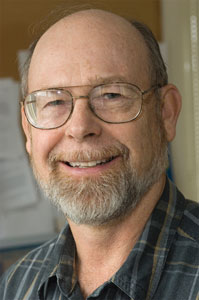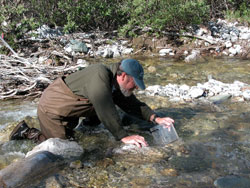MBL Senior Scholar Bruce Peterson Wins A.C. Redfield Award for Career Achievements in Aquatic Science

MBL, WOODS HOLE, MA—Dr. Bruce J. Peterson, a senior scholar at the Marine Biological Laboratory (MBL) has been selected by the Association for the Sciences of Limnology and Oceanography (ASLO) to receive the 2013 Alfred C. Redfield Lifetime Achievement Award. The award honors the career achievements of an aquatic scientist whose work is recognized for its importance and long-term influence. Dr. Peterson is being honored for “innovative and transformative studies of carbon, nutrient, and water cycles at process, ecosystem, and global scales.” He will receive the award at the ASLO Aquatic Sciences Meeting in New Orleans on February 17.

Dr. Peterson has made seminal contributions in fields ranging from oceanography to limnology, biogeochemistry, ecology, and hydrology. Among these are his use of new methods of analysis, his excellence as a synthesizer, and numerous scientific publications.
“I’m surprised and very excited,” said Dr. Peterson, who began his career at the MBL nearly 40 years ago. “This honor puts a capstone on my career and gives me an opportunity to reflect and put things in context, which is something I never would have done unless I received this award.”
“This is the premier ASLO award and it could have not been presented to a finer scientist,” said ASLO President John Downing.
Throughout his career, Dr. Peterson has studied the cycles that influence ecosystem behavior. His work is relevant to the management and prediction of ecosystem properties in Arctic streams and rivers, nitrogen cycling in headwater streams and estuaries, and the impacts of climate change on the freshwater cycle of the Arctic.
Much of Dr. Peterson’s research has been based at Alaska’s Toolik Field Station, where, for the last 30 years, he and his colleagues have conducted a nutrient enrichment experiment in the Kuparuk River. The experiment has revealed a general principle of how streams respond to disturbance and is being used as a prototype in the National Ecological Observatory Network, a National Science Foundation-funded observation system that will gather ecological and climate data over the next 30 years at more than 60 terrestrial and aquatic observatory sites across the U.S.
 MBL Ecosystems Center senior scientist Bruce Peterson peers through a viewfinder at the bottom of a stream. Credit: Laura Broughton
MBL Ecosystems Center senior scientist Bruce Peterson peers through a viewfinder at the bottom of a stream. Credit: Laura Broughton"Bruce has been, from the beginning, a wonderfully creative thinker about how ecosystems work,” said Christopher Neill, Director of the MBL Ecosystems Center. “He thinks big and then engages others to think big with him. He's demonstrated that over and over again in his career."
Dr. Peterson also pioneered the tracer approach to investigation of the nitrogen cycle of streams. The technique, first developed for an experiment in the Kuparuk River, has transformed the study of streams and is now used worldwide. “That one experiment has led to many experiments around the world that use this approach,” says Dr. Peterson. “I’ve been really fortunate in that regard, some of the experiments that I have developed with MBL colleagues and others have spawned whole networks of research—it’s a real joy.”
According to Dr. Peterson, a particularly rewarding part of his career has been working with Russian collaborators to study the freshwater cycle of the Arctic. “I lived during the Cold War and drills at school had us preparing for a nuclear attack,” said Dr. Peterson, “My dad was an expert in anti-submarine warfare and spent his career tracking Russian submarines. So, it was particularly gratifying to travel to the great rivers of northern Russia and find that Russian scientists were willing to share information and help us understand global change in the Arctic.” Now known as the Arctic Great Rivers Observatory, the NSF-funded project has made fundamental advances in the understanding of land-ocean interactions in the Arctic and has set the baseline against which to judge future changes in the Arctic.
Dr. Peterson received a Bachelor’s Degree in Biology from Bates College in Lewiston, Maine, and a Ph.D. from Cornell University. He performed postdoctoral research on the Hubbard Brook Ecosystem Study and at North Carolina State University. He joined the MBL’s Ecosystems Center in 1976, rising up the ranks from postdoctoral associate to senior scientist. Dr. Peterson is a member of the Association for the Sciences of Limnology and Oceanography, the American Association for the Advancement of Science, the Estuarine Research Federation, and the MBL Corporation. In 2008, Dr. Peterson shared ASLO’s John Martin Award with Richard Eppley of Scripps Institution of Oceanography.
—###—
The Marine Biological Laboratory (MBL) is dedicated to scientific discovery and improving the human condition through research and education in biology, biomedicine, and environmental science. Founded in 1888 in Woods Hole, Massachusetts, the MBL is an independent, nonprofit corporation.